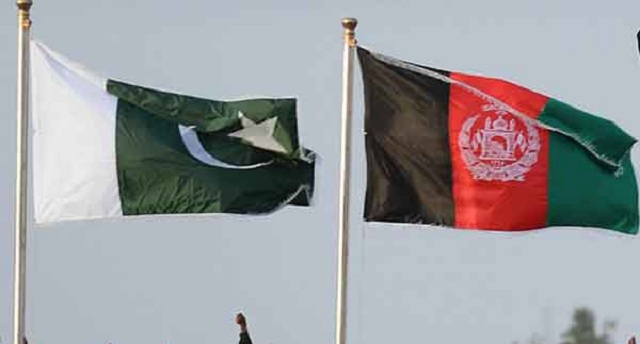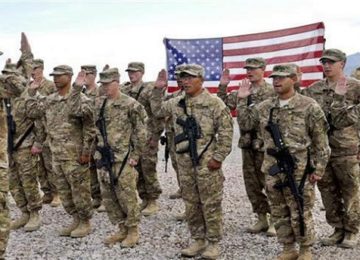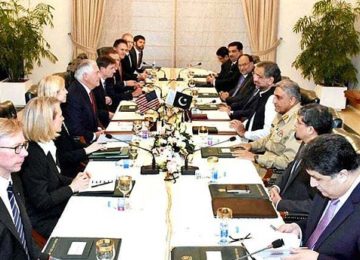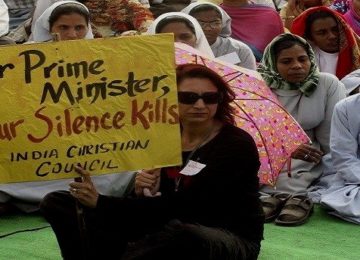December 22, 2017
Undoubtedly, improvement in bilateral relations between Kabul and Islamabad is imperative for regional and global peace but, given the existing wall of mutual distrust, there is still a long way to go for the relationship to become more meaningful.
The recent round of bilateral talks had raised hope of reopening a window of opportunity for Islamabad and Kabul to build an atmosphere of mutual trust and put mutual ties on a more stable footing. But there is little sign of breaking of ice. Indeed there has been marked lowering of hostile rhetoric from both sides yet the wall of distrust obstructs attempts to move forward and address the main sources of tension between the two neighboring countries.
It is not just about the relations between the two governments; the adverse Afghan public opinion towards Pakistan has made it more difficult for normalisation of relations between the two countries. The bitterness is more pronounced among the younger generation of Afghans.
There are very few who would support Pakistan. Most Afghans blame Pakistan for their plight, despite the fact that Pakistan hosted millions of Afghan refugees for the past four decades. The feeling is not restricted to any particular ethic group- it is across the board. Many students I interacted with at a private university in Kabul last week were critical of Pakistan for allegedly supporting the Taliban insurgents.
Among them there were many who were either born in Pakistan or whose parents had lived there as refugees for decades.
The question regarding Pakistan’s alleged support for the Taliban insurgents is not only regularly raised at official meetings but also questioned by the public. The rise of Taliban insurgents is seen by the younger generation as the most serious threat to the gains made in the field of education. Education is one are where Afghanistan has made remarkable progress despite political instability and spreading insurgency. Hundreds and thousands of students, large number of then female, are enrolled in more than one dozen universities in Kabul alone.
Anti Pakistan feeling are much stronger among senior Afghan government officials and cabinet ministers many of whom had spent large part of their lives in Pakistan and received education thee. Curiously even former Taliban officials who now live in Kabul are critical of Pakistan’s policies.
There is no denying of the fact that there has been a systematic campaign to malign Pakistan. But still one needs to see whether our own policies have contributed to fuel those negative sentiments against the country that has hosted millions of Afghan refugees for decades.
A major flaw in our Afghan policy is that it is solely driven by misplaced national security concerns. Diplomacy has been consigned to back seat. What has made things more complicated is past baggage and Afghanistan being turned into a centre of a new Great Game.
India’s growing presence in Afghanistan is also cast its shadow over the relations between Kabul and Islamabad. Pakistan accuses India of supporting Pakistani militant groups taking sanctuaries across the border in Afghanistan. But many in Kabul believe that Pakistan’s concerns about Indian role are highly exaggerated. Afghan official see Pakistan’s objection as meddling in their internal matters.
Indeed, Pakistani militant groups having been granted sanctuaries across the border have become a major source of tension between Islamabad and Kabul. The recent meeting between the Pakistani delegation led by army chief Gen Qamar Bajwa and Afghan President Ashraf Ghani had agreed to take more concrete suggestions for evolving a common strategy to deal with cross-border sanctuaries that have been the biggest cause of tension between the two countries.
The meeting was described as the most constructive since the breakdown of ties in 2015. Relations had hit a new low following a short period of bonhomie between the two countries in the early period of Ghani’s presidency. The biggest opportunity to mend fences was completely lost. Since then, the two countries have been engaged in a bitter war of words accusing one another of providing sanctuaries to each other’s insurgents.
The most important outcome of the meeting in October was the assurances given by Afghan leaders that the Afghan forces backed by additional American troops were now in a better position to tackle the Pakistani Taliban and other militant sanctuaries in their territory.
It is going to be a big test for the Afghan forces. But it would be a much bigger challenge for the military leadership here to eliminate the alleged Afghan Taliban safe havens inside Pakistan, even though the latter continues to deny their presence here. It remains to be seen how Pakistani authorities deal with this sensitive issue that has been a source of tension not only with Afghanistan but also with Washington.
Both insist that sanctuaries on Pakistani soil have enabled the Afghan Taliban to sustain and expand insurgent operations in Afghanistan over the past 16 years. The pressure is increasing on Islamabad to take decisive action against the Taliban groups, particularly the Haqqani network.
It is not only important for Pakistan to improve relations with the Kabul government, but also to bridge the widening gap with the Afghan people. We have failed to take advantage of our geographical and cultural proximity to win public goodwill and strengthen our economic and trade ties in order to neutralise the antagonists. It is not just geopolitics but also geo-economics that should be driving our Afghan policy.
The recent measures taken by Pakistani authorities to send back Afghan refugees and put restrictions on cross-border travel have added to the indignation. Many complain about long queues for visa and difficulties in travelling to Peshawar for medical treatment. Unnecessary travel restrictions under the pretext of border management have further alienated the Afghans. The move has also affected trade, with Pakistani exporters suffering greater losses.
Although Pakistan remains Afghanistan’s biggest trading partner, the situation may change soon with Iran and Central Asia making significant inroads into the Afghan markets. The move to close down the border for over a month early this year has dealt an irreversible blow to Pakistan’s exports to Afghanistan that had reached between $2 billion and $5bn in 2014.
Undoubtedly, improvement in bilateral relations between Kabul and Islamabad is imperative for regional and global peace But, given the existing wall of mutual distrust, there is still a long way to go for the relationship to become more meaningful.
The author Zahid Hussein visited Kabul as part of CRSS initiative Beyond Boundaries, the Pak-Afghan Track 1.5/11 (Dec 14-17, 2017).
© Center for Research and Security Studies (CRSS) and Afghan Studies Center (ASC), Islamabad.
Disclaimer: Views expressed on this blog are not necessarily endorsed or supported by the Center for Research and Security Studies, Islamabad.








